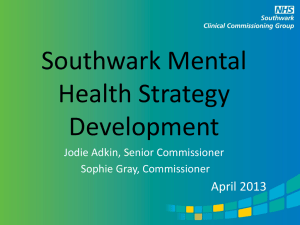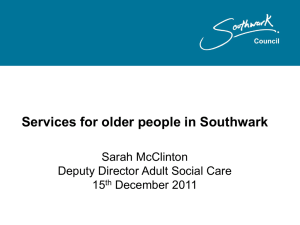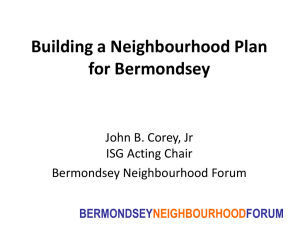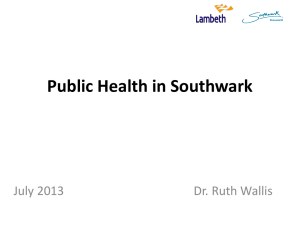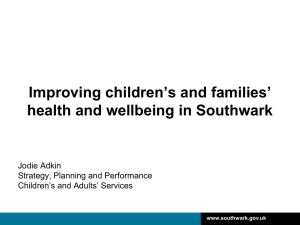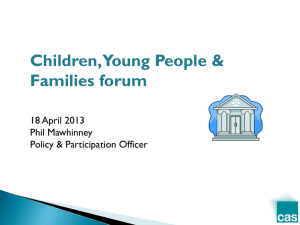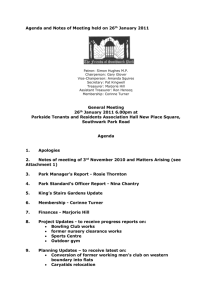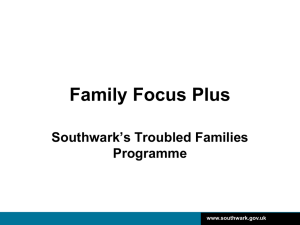DRAFT Diversity Standard Consultation paper Statement from
advertisement
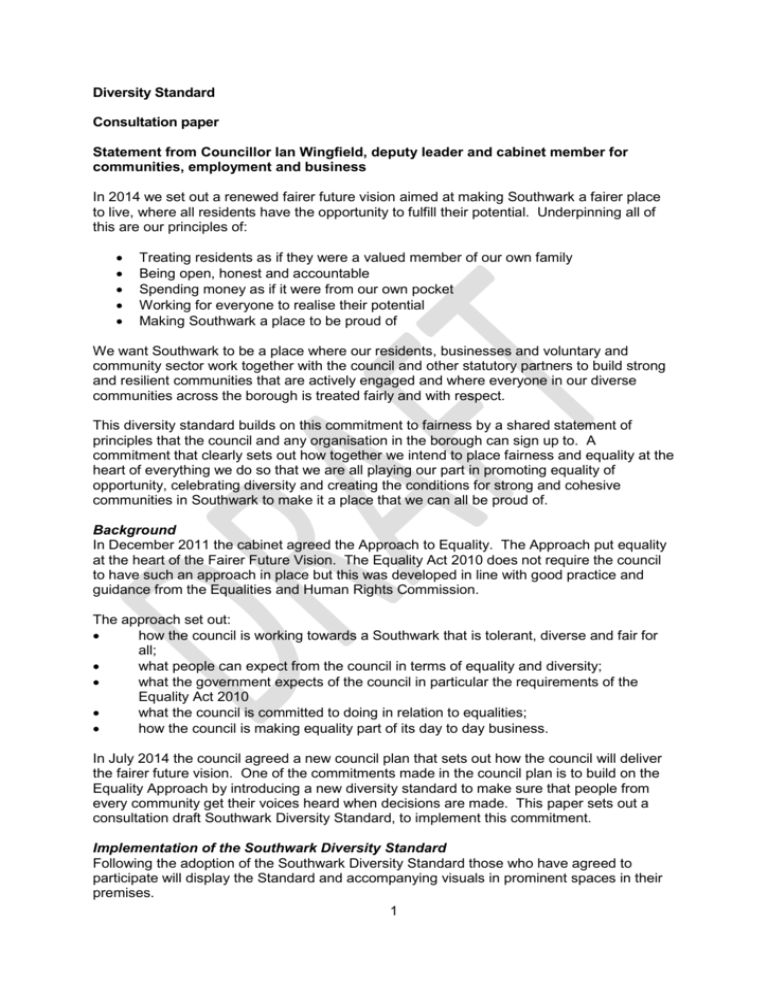
Diversity Standard Consultation paper Statement from Councillor Ian Wingfield, deputy leader and cabinet member for communities, employment and business In 2014 we set out a renewed fairer future vision aimed at making Southwark a fairer place to live, where all residents have the opportunity to fulfill their potential. Underpinning all of this are our principles of: Treating residents as if they were a valued member of our own family Being open, honest and accountable Spending money as if it were from our own pocket Working for everyone to realise their potential Making Southwark a place to be proud of We want Southwark to be a place where our residents, businesses and voluntary and community sector work together with the council and other statutory partners to build strong and resilient communities that are actively engaged and where everyone in our diverse communities across the borough is treated fairly and with respect. This diversity standard builds on this commitment to fairness by a shared statement of principles that the council and any organisation in the borough can sign up to. A commitment that clearly sets out how together we intend to place fairness and equality at the heart of everything we do so that we are all playing our part in promoting equality of opportunity, celebrating diversity and creating the conditions for strong and cohesive communities in Southwark to make it a place that we can all be proud of. Background In December 2011 the cabinet agreed the Approach to Equality. The Approach put equality at the heart of the Fairer Future Vision. The Equality Act 2010 does not require the council to have such an approach in place but this was developed in line with good practice and guidance from the Equalities and Human Rights Commission. The approach set out: how the council is working towards a Southwark that is tolerant, diverse and fair for all; what people can expect from the council in terms of equality and diversity; what the government expects of the council in particular the requirements of the Equality Act 2010 what the council is committed to doing in relation to equalities; how the council is making equality part of its day to day business. In July 2014 the council agreed a new council plan that sets out how the council will deliver the fairer future vision. One of the commitments made in the council plan is to build on the Equality Approach by introducing a new diversity standard to make sure that people from every community get their voices heard when decisions are made. This paper sets out a consultation draft Southwark Diversity Standard, to implement this commitment. Implementation of the Southwark Diversity Standard Following the adoption of the Southwark Diversity Standard those who have agreed to participate will display the Standard and accompanying visuals in prominent spaces in their premises. 1 The council will develop supporting tools and guidance for participating organisations that will be available on the council website and include case-studies of good practice in statutory, voluntary and private sectors. Officers will continue to work with organisations in the borough to encourage more organisations to adopt the Standard. Consultation The views of the following organisations will be sought through the consultation. the new Business Forum, the Southwark Voluntary Sector Forum the Multi-Faith Forum the Forum for Equalities and Human Rights in Southwark the Safer Southwark Partnership Details of the consultation will be reported back to Cabinet in due course and the draft Diversity Standard will be amended to reflect any considerations raised during the consultation. The Standard in its final form will be subject to final Cabinet approval. This document sets out the proposed diversity standard. It is in two parts: Part 1: intended for adoption for all organisations across the borough to consider signing up to Part 2: sets out the council’s commitments We welcome comments and suggestions on both parts of the Diversity Standard as our intention is to make the final version as robust and widely accepted as possible. Please send comments by 17th December 2015 to: sarah.totterdell@southwark.gov.uk 2 The Southwark Diversity Standard Part 1: A Fairer Future for All This part of the Standard is intended for all organisations within the Borough to sign up to: private, public and voluntary, and has been greeted with enthusiasm from those who have already been involved. It is intended, as a starting point, to aim for the following groups and then their wider membership to sign up to the standard: the new Business Forum, the Southwark Voluntary Sector Forum the Multi-Faith Forum the Forum for Equalities and Human Rights in Southwark the Safer Southwark Partnership We want to create a fairer future for all in Southwark by protecting the most vulnerable; by looking after every penny as if it was our own; by working with local people, communities and businesses to innovate, improve and transform public services; and standing up for everyone's rights. As a central London borough, our mission is to enhance the things that make Southwark special - its immense diversity and vast depths of untapped potential. Helping to unlock those talents, with nobody left behind, is what we are about. People in the borough should be able to enjoy the enormous benefits and seize the opportunities that living in central London offers. Between us, we have the knowledge, skills and creativity to solve the major problems we are facing together. This spirit of cooperation goes beyond just problem-solving. We will look honestly at everything we do and ask: 'can we do it better?'. We'll work to get things right first time, every time and say so when things have gone wrong. We will improve our customer service with our citizens and get them more involved with local decision making. Our approach is underpinned by empathy, openness and trust. This is not a borough where cultures clash, but where by coming together Southwark residents create a strong sense of community. We will reflect this as an organisation by showing residents true compassion and the same care and consideration that we show members of our own families. We'll build a fairer place to live, where our tenants have homes that are warm, dry and safe, and where we care for the old and vulnerable. We will put in place policies that support young people to encourage their aspirations and to make the best of themselves with access to the jobs, the best education and training opportunities that living in the heart of the capital city should offer. We will work together with residents, businesses and partners to transform public services for the people of Southwark. We will foster a culture of innovation and imagination that enables us to build a brighter future for all. We'll also work with our residents and the police to make the streets safer. We'll encourage healthy lifestyles among individuals and families by having quality parks, open spaces and leisure services. Over the longer term, regeneration in the north of the borough will continue to pull the benefits of being in the centre of London southwards towards Elephant and Castle and beyond. This regeneration must work for local people and the benefits be felt right across the borough. We know that, given the levels of deprivation in Southwark, the cuts to our budget will 3 disadvantage our borough disproportionately. But we will be guided by our budget principles and will listen to local people, seek to protect our most vulnerable residents, whilst at the same time aiming to preserve quality front-line services for all of our residents. We have to focus our limited resources on the areas where we feel we can make the most positive impact in delivering our fairer future vision. But securing a fairer future is more than just what the council can do with its own resources. The borough has a rich array of talents, for example those who are helping others day in day out through local voluntary and community organisations, and strong communities in street after street across our borough. Our commitments to diversity explain how the council is working towards a Southwark that is tolerant, more equal and fair for all. It sets out what people can expect from the council, what the Government expects of us, and what the council is committed to doing. It explains our approach to advance equality of opportunity in the borough by making equality part of our day-to-day business. As a council, we will believe that citizens can become stronger through the practice and respect of human rights with the belief that all citizens in Southwark are treated with fairness, respect, equality, dignity and autonomy. This standard is designed to be one that the council, its partners and others in the business and voluntary and community sector can sign up to. Our Commitments to Diversity This Standard is about encouraging equality of opportunity, respect for diversity and preventing unlawful discrimination in the relationship with customers, service users and residents. It applies in respect of age, disability, gender reassignment, marriage and civil partnership, pregnancy and maternity, race, religion or belief, sex and sexual orientation. All staff make a contribution to the standard by treating each other and customer, service users and residents fairly and with respect, following the principles in the workplace and challenging behaviour and processes that are inappropriate. In complying with the Standard our commitment is to: Make sure that everyone who needs to can access our services and make sure that they are tailored to meet the diverse needs of our service users and our staff. Make sure that all our staff at every level are aware of and contributing to our commitment to equality and diversity. Actively promote equality of opportunity and good relations between all sections of the community and get actively involved in our local community, contributing to mixed diverse and cohesive communities. Ensure in the way we do business that there is a welcoming culture where everyone is treated with respect and dignity, everyone feels valued and everyone who needs to has the opportunity to gain access to the goods, services and facilities that we provide. Not discriminate unlawfully, or victimise or harass anyone in the course of carrying out our business. Make equality and human rights part of everything we do treating people fairly and with 4 respect and understanding, celebrating and promoting difference. Provide services to customers in a way that respects diversity and consider how our services can affect different groups differently taking action to tackle barriers to access where these exist. Make reasonable adjustments to ensure that customers and service users with disabilities and staff are not placed at a disadvantage compared to those who are not disabled. Our approach to recruitment and throughout employment encourages equality of opportunity and respect for diversity. Our approach to staff development and progression is fair, makes sure everyone has the opportunity to fulfill their potential and takes action to address any barriers faced by specific groups. We actively work to create a workforce at every level that is representative of the local community or customers. Understand that people living in poverty and those on low incomes experience barriers to equality of opportunity and take action to tackle these barriers where they exist. Ensure that all our workers are paid at least the Living Wage. Ensure that we do not use zero hours contracts in place of permanent contracts. Work with our local community and local community organisations to tackle inequality for example by supporting people to develop the skills they need to participate economically, culturally and socially Deal with any complaints of discrimination promptly, fairly, openly and effectively. Welcome feedback engaging customers, service users and the community and understand how our decisions impact on different groups of people. Collect information from service users in a range of ways to gain a better understanding of our customers and their diverse needs. Encouraging other employers to adopt similar practices. 5 Part 2: How the Council will meet the Standard This part of the Standard is the recognition that the Council has a public duty and legal obligation to promote diversity by ensuring that all its services in the borough are provided in a fair and accessible way to all residents. We are a public authority and are bound by the Equality Act 2010. The duty covers groups of people, referred to in the Act as sharing the following protected characteristics: age, disability, gender reassignment, marriage and civil partnership, pregnancy and maternity, race, religion/belief, sex, and sexual orientation. The Public Sector Equality Duty requires us to have regard for the need to: Eliminate unlawful discrimination, harassment and victimisation and other conduct prohibited by the act; Advance equality of opportunity between people who share a protected characteristic and those who do not; Foster good relations between people who share a protected characteristic and those who do not. Southwark is one of the most diverse boroughs in London. It is culturally diverse and is a beacon for attracting global talent from around the world. By using the standard the authority will be able to assess whether it involves all those communities and has in place effective engagement structures. This Standard builds on the Community Engagement framework, and Describes the ways in which it will work with the local community in making decisions; Sets the criteria for selecting those groups who require attention for equalities considerations; Adheres to principles in terms of decision-making. Ways in which we will work with the community We will involve people in Southwark in the planning, delivery, monitoring and evaluation of services. We shall do this by: Asking what services people want through community conversations, questionnaires and surveys Arranging meetings either virtual or real, to consult on what type of services people want through discussion forums, using My Southwark and encouraging petitions and deputations Devolving more decision making to the locality whether it is the estate, neighbourhood or area by holding meetings which allow people to participate. Deliberating on decisions in an open and transparent way by Leaders Question Time, Cabinet and Assembly meetings in public Providing feedback through people on what decisions are made, why certain views were taken into account and why others were not through regular and up to date information on the website Monitoring and evaluating our services to see who uses them and who doesn’t and changing them to adapt to new needs Selecting those groups who require attention for equalities considerations Diversity means appreciating, understanding and valuing the differences within Southwark and enabling everyone in the borough to participate. We acknowledge that some groups of people face discrimination and have intentional and 6 unintentional barriers placed between them and the Council, which limits their involvement. Specifically we will ensure all our decisions are made by ensuring we take into account: Age Disability Gender reassignment Marriage and civil partnership Pregnancy and maternity Race Religion and belief Sex Sexual orientation To enable this we will use existing forums which cater for these groups alongside wider consultation, as well as ensuring any information we provide on services meets the needs of these people as outlined in ‘Our Commitments to Diversity’ set out in the first part. Principles of inclusive decision-making The key principles that we will use in making decisions, are that we will: Be clear about what the scope of our engagement is, whether we are communicating, consulting, deciding together or acting together. Engage when we know it will make a difference, when there is a real opportunity for people to have an impact and influence decisions on issues that local people care about. Engage at the right time, at an early enough stage for there to be an opportunity to genuinely influence a policy or service Allow sufficient time for good quality engagement to take place. Be clear about what we are asking, what opportunities there are to shape services and be honest about what can and can’t be achieved. We will ensure that our engagement is accessible and targeted to those it needs to reach using a variety of engagement methods to broaden participation and overcome any barriers people may have in engaging with us. Aim to engage as widely as possible so that we increase engagement with those who are not already in touch with the council. Tell people what has happened as a result of their engagement 7
